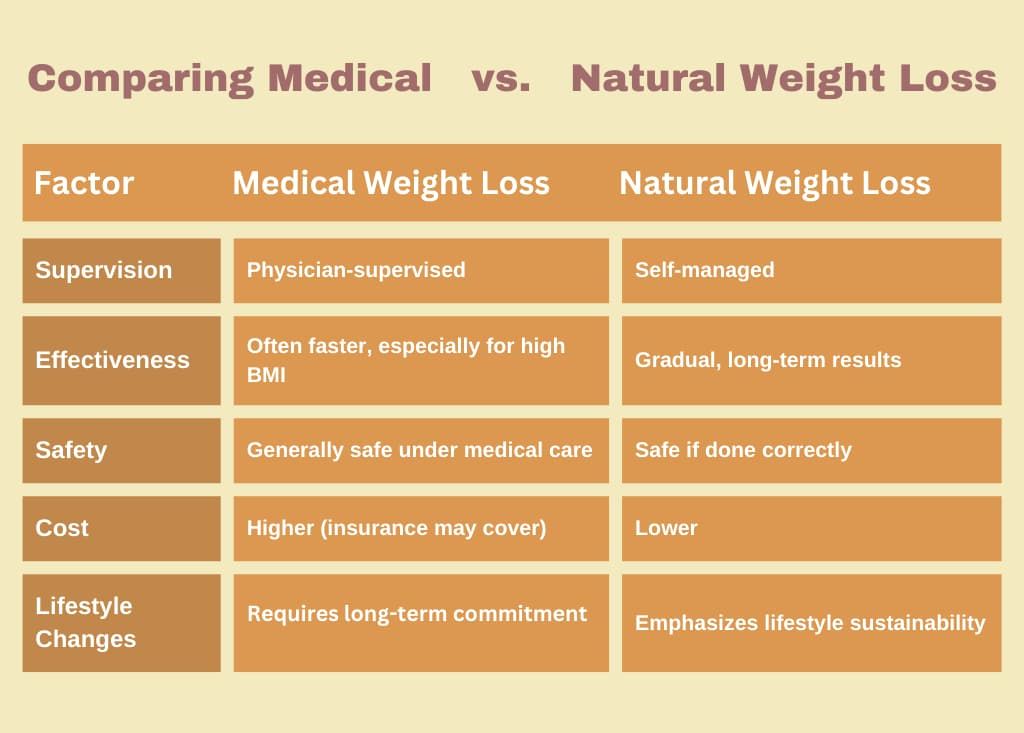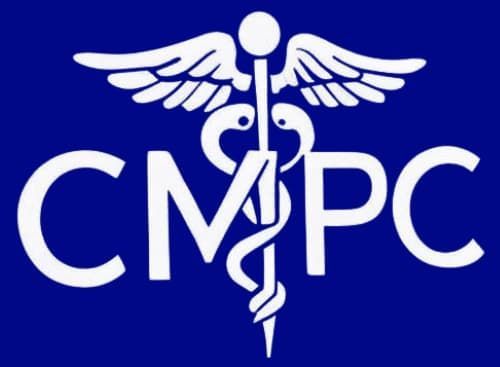
When it comes to weight loss, individuals with a high BMI often explore various options, from natural lifestyle changes to medical interventions. The choice between medical weight loss treatments and natural methods depends on several factors, including health conditions, weight loss goals, and personal preferences. Both approaches have their benefits and potential drawbacks, and understanding the differences can help you make an informed decision.
Understanding Medical Weight Loss Treatments
Medical weight loss treatments are evidence-based interventions supervised by healthcare professionals, such as physicians, dietitians, and endocrinologists. These treatments are designed to address obesity with a structured and personalized approach.
Common Medical Weight Loss Options
1. Prescription Medications
FDA-approved drugs such as Orlistat, Liraglutide, and Phentermine play a role in medical weight loss by targeting different aspects of metabolism and appetite regulation.
- Orlistat works by inhibiting the enzyme lipase, which breaks down fats in the digestive system. As a result, a portion of dietary fat is not absorbed by the body and is instead excreted, leading to reduced calorie intake. It is often prescribed for individuals who struggle with fat digestion and need additional support in reducing fat consumption.
- Liraglutide, a glucagon-like peptide-1 (GLP-1) receptor agonist, mimics a natural hormone that regulates appetite and insulin secretion. It slows down digestion, increases feelings of fullness, and helps individuals eat less over time. Initially developed for diabetes management, it has proven effective in weight loss by helping control hunger and cravings.
- Phentermine is a stimulant that affects the central nervous system by suppressing appetite. It is typically prescribed for short-term use to help kickstart weight loss efforts in individuals with obesity. By reducing hunger sensations, it makes it easier to adhere to a calorie-controlled diet.
These medications are typically recommended for individuals with a BMI of 30 or higher (or 27 with obesity-related conditions). They are most effective when combined with lifestyle changes such as diet and exercise. However, they may have side effects and require medical supervision to ensure safety and effectiveness.
BMI Criteria for Prescription Medications
Weight loss medications are not usually prescribed to individuals with a BMI within the normal or overweight range unless there are significant health concerns. The standard guideline for prescription eligibility is:
- A BMI of 30 or higher (categorized as obesity) qualifies an individual for medical weight loss treatments without additional health conditions.
- A BMI of 27 or higher with obesity-related conditions (such as type 2 diabetes, hypertension, or sleep apnea) also qualifies an individual, as excess weight may be exacerbating these conditions.
Why These BMI Ranges Matter
The rationale behind these thresholds is based on clinical evidence showing that individuals with a BMI in these ranges are at a higher risk for chronic diseases. When combined with lifestyle changes, medical interventions can help reduce these risks more effectively than alone.
Personalization of Treatment
While BMI is a key indicator, doctors also consider metabolic health, weight history, and previous weight loss attempts when prescribing medical treatments. This ensures that the treatment is appropriate and beneficial for the individual.
2. Meal Replacement Programs
Structured diets that include nutritionally balanced shakes and bars can help create a calorie deficit while ensuring essential nutrient intake.
Definition of Structured Diets with Meal Replacements:
Meal replacement programs involve consuming shakes, bars, or portion-controlled meals designed to provide balanced nutrition while reducing calorie intake.
These structured diets are formulated to ensure an adequate intake of essential nutrients such as proteins, vitamins, minerals, and fibre while restricting excess calories.
How They Create a Calorie Deficit:
A calorie deficit occurs when the body burns more calories than it consumes. By replacing high-calorie meals with portion-controlled shakes or bars, individuals naturally consume fewer calories while meeting their nutritional needs.
These meal replacements are designed to be nutrient-dense and low in unhealthy fats and sugars, ensuring that individuals lose weight without experiencing deficiencies.
Nutritional Balance and Benefits:
Meal replacement programs provide sufficient macronutrients, including proteins, carbohydrates, fats, and micronutrients like vitamins and minerals, unlike fad diets that eliminate entire food groups.
They help prevent muscle loss during weight loss by ensuring sufficient protein intake.
Many shakes and bars are fortified with fibre, healthy fats, and antioxidants, supporting digestive health and overall well-being.
Who Benefits from Structured Diets
People with high BMI need a guided, portion-controlled approach to weight loss.
Individuals who struggle with meal planning or portion control require convenient, pre-measured options. Additionally, individuals seeking medically supervised weight loss benefit from having healthcare professionals monitor their progress and make necessary adjustments.
Potential Challenges and Considerations
Meal replacements can be effective for initial weight loss but should eventually transition into a balanced whole-food diet for long-term sustainability.
They may lack variety, leading to boredom if not incorporated with other dietary options.
Some individuals may prefer a whole-food approach rather than relying on pre-packaged shakes and bars.
Structured meal replacement diets are scientifically designed to facilitate safe and effective weight loss while maintaining proper nutrition. However, they work best when combined with lifestyle modifications, and transitioning to a whole-food-based diet over time ensures lasting success.
Non-Surgical Procedures
The Allurion Gastric Balloon Program is a non-invasive medical weight loss treatment designed to assist individuals in achieving their weight loss goals without surgery.
How the Allurion Gastric Balloon Works
The Allurion Balloon is a swallowable capsule that expands in the stomach to reduce stomach capacity, creating a feeling of fullness and helping individuals eat smaller portions.
Once swallowed and positioned correctly, the balloon is inflated with liquid, taking up space in the stomach and slowing down gastric emptying, which prolongs satiety after meals.
Unlike traditional gastric balloons that require endoscopic procedures for placement and removal, the Allurion Balloon naturally degrades and passes through the digestive system after approximately 16 weeks, eliminating the need for surgical intervention.
Benefits of the Allurion Gastric Balloon
Non-Surgical & Temporary
- There is no need for anesthesia, incisions, or hospital stays.
- The balloon dissolves naturally, making it a short-term but effective tool for weight loss.
Promotes Portion Control
- By occupying space in the stomach, the balloon helps individuals feel full sooner and for extended periods, making it easier to stick to a calorie-controlled diet.
Helps Reset Eating Habits
- Over time, the presence of the balloon encourages individuals to adopt healthier eating behaviours, which can continue even after the balloon has dissolved.
Rapid Yet Sustainable Weight Loss
- Many individuals experience significant weight loss in the first few months, which can be maintained through continued lifestyle adjustments.
Comprehensive Support Program
- The Allurion Program includes nutritional counselling, behavioural coaching, and digital tracking tools to help individuals build long-term healthy habits alongside the gastric balloon.
Who Can Benefit from the Allurion Balloon?
- It is designed for individuals with a BMI of 27 or higher who need support in controlling portion sizes and reducing overeating.
- The balloon is ideal for those who want medical intervention but prefer a non-surgical option.
- It is beneficial for individuals who have struggled with traditional dieting methods and need additional support to jumpstart weight loss.
The Allurion Gastric Balloon Program is an innovative, non-invasive weight loss solution that aids individuals in reducing stomach capacity, controlling portions, and fostering healthier eating habits. Combining the balloon with a structured nutrition and lifestyle plan allows patients to achieve meaningful and sustainable weight loss without surgery.
Hormonal Therapy
Addresses underlying hormonal imbalances that may be hindering weight loss efforts.
1. How Hormonal Imbalances Affect Weight Loss
Hormones regulate metabolism, appetite, fat storage, and energy expenditure. An imbalance in key hormones can significantly impact weight loss efforts, making it difficult to shed excess weight despite diet and exercise.
Insulin Resistance:
- Insulin is responsible for regulating blood sugar levels. When the body becomes resistant to insulin (standard in prediabetes and type 2 diabetes), it stores more fat, making weight loss challenging.
- Medical interventions, such as metformin or other insulin-sensitizing drugs, can help balance insulin levels and improve fat metabolism.
Thyroid Dysfunction:
- The thyroid gland produces hormones (T3, T4) that regulate metabolism. An underactive thyroid (hypothyroidism) slows down metabolism, leading to weight gain and difficulty losing weight.
- Thyroid hormone replacement therapy (levothyroxine) can correct imbalances, improve metabolism, and aid in weight management.
Leptin Resistance:
- Leptin is the "satiety hormone" that signals the brain when you're full. In leptin resistance, the brain fails to receive these signals, leading to overeating and weight gain.
- Treatments focus on dietary changes, sleep improvement, and potential medication to restore leptin sensitivity.
Cortisol and Stress Hormones:
- High-stress levels increase cortisol, which promotes fat storage, particularly in the abdominal area.
- If needed, stress management techniques (mindfulness, exercise, or medication) can help balance cortisol and support weight loss.
Estrogen and Testosterone Imbalances:
- Low testosterone levels in men can increase body fat and reduce muscle mass, making weight loss harder.
- Estrogen dominance in women (common in PCOS) can contribute to weight gain and insulin resistance.
- Hormonal therapies, such as testosterone replacement or medications like birth control pills or metformin for PCOS, may help regulate hormone levels and aid weight loss.
2. Medical Approaches to Address Hormonal Imbalances
- Hormone Replacement Therapy (HRT) is used to treat conditions such as hypothyroidism or testosterone deficiency.
- Medications like metformin, GLP-1 agonists (such as Ozempic), and other insulin regulators can help address metabolic imbalances.
- Lifestyle interventions include dietary modifications, effective stress management, and improvements in sleep patterns.
If you’ve been struggling with weight loss despite a consistent diet and exercise routine, underlying hormonal imbalances could be a contributing factor. Consulting with a healthcare provider for hormone testing and potential medical interventions can help optimize weight loss efforts and improve overall well-being.
Advantages of Medical Weight Loss
- Healthcare professionals supervise the process to ensure safety and effectiveness.
- The program is tailored to accommodate individual health conditions and specific needs.
- This approach often results in faster and more significant weight loss.
Drawbacks of Medical Weight Loss
- Medications may cause potential side effects that should be considered.
- The costs of medications might be higher when compared to natural treatment methods.
- Ongoing medical monitoring is required when using these medications.
- Understanding Natural Weight Loss Methods
- Natural weight loss involves lifestyle changes focusing on diet, exercise, and behavioural modifications without medical intervention. This approach is often the first step individuals take to lose weight.
Common Natural Weight Loss Strategies
Why Focus on Whole, Unprocessed Foods?
Whole, unprocessed foods are minimally altered from their natural state, meaning they retain essential nutrients, fibre, and beneficial compounds that contribute to overall health and weight management.
Nutrient Density Over Empty Calories:
- Whole foods are rich in vitamins, minerals, fibre, and antioxidants, which support metabolism, digestion, and overall health.
- In contrast, processed foods are often stripped of nutrients and contain excessive sugars, unhealthy fats, and artificial additives that may lead to weight gain and metabolic imbalances.
Sustained Energy and Satiety:
- Whole grains (such as quinoa, brown rice, and oats) and lean proteins (such as chicken, fish, tofu, and legumes) provide slow-releasing energy, keeping blood sugar levels stable and preventing energy crashes that lead to cravings.
- High-fibre vegetables (such as spinach, broccoli, and carrots) and healthy fats (such as avocados, nuts, and olive oil) promote fullness and reduce the likelihood of overeating.
Supports Digestive Health and Gut Microbiome:
- Whole foods are fibre-rich and prebiotics, nourishing gut bacteria and supporting a healthy digestive system.
- A well-functioning gut microbiome has been linked to better weight management, reduced inflammation, and improved metabolic health.
How This Diet Aids in Weight Loss
- Naturally Reduces Calorie Intake: Since whole foods are more filling and satisfying, individuals are less likely to overeat than processed foods with sugars and refined carbohydrates.
- Improves Metabolic Rate: Nutrient-dense foods enhance metabolic functions, allowing the body to burn fat and maintain energy balance efficiently.
- Reduces Sugar Cravings and Emotional Eating: A diet rich in whole foods helps stabilize blood sugar levels, preventing spikes and crashes that often lead to cravings for high-calorie, processed foods.
Focusing on whole, unprocessed foods does not mean you have to restrict yourself; instead, it promotes a balanced approach to eating. By making vegetables, lean proteins, healthy fats, and whole grains the main components of your diet, you can achieve sustainable weight loss over time and improve your overall health.
Regular Exercise
- Combining cardiovascular exercises such as walking, running, and swimming with strength training helps to build muscle and increase metabolism.
Behavioural Changes
- Establishing healthy habits includes monitoring your meals, managing stress levels, and ensuring you get enough sleep.
Support Systems
- Think about joining support groups or getting help from nutritionists and fitness coaches.
Advantages of Natural Weight Loss
- Sustainable and encourages lifelong healthy habits.
- No side effects from medications or procedures.
- Cost-effective compared to medical treatments.
Drawbacks of Natural Weight Loss
- It may take longer to see significant results.
- Requires a high level of self-discipline and motivation.
- It can be challenging for individuals with underlying medical conditions.

So, which approach is right for you?
The best approach depends on your individual needs and goals. Consider the following when deciding between medical and natural weight loss methods:
Medical Weight Loss May Be Right If:
- You have a BMI of 30 or higher with obesity-related health conditions.
- Previous natural weight loss attempts have been unsuccessful.
- You need medical supervision due to existing health concerns.
Natural Weight Loss May Be Right If:
- You prefer a gradual, sustainable approach.
- You have the motivation and time to implement lifestyle changes.
- You do not have any severe health conditions requiring medical intervention.
Combining Both Approaches for Optimal Results
For many individuals, a combination of both medical and natural weight loss methods yields the best results. Medical interventions can provide an initial boost, while natural methods help maintain the weight loss long-term. Programs like the Allurion Gastric Balloon can complement a healthy lifestyle by aiding portion control while you work on improving your diet and exercise habits.
We can help you make an informed choice…
Both medical weight loss treatments and natural methods have advantages and can be effective depending on individual circumstances. Consulting with a healthcare professional can help determine the most suitable path for your weight loss journey, ensuring safety, effectiveness, and long-term success.
Want to know more on how to lose weight and live healthier?
Book a FREE Consultation!










